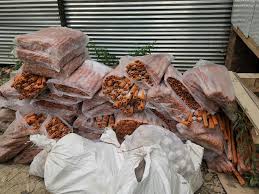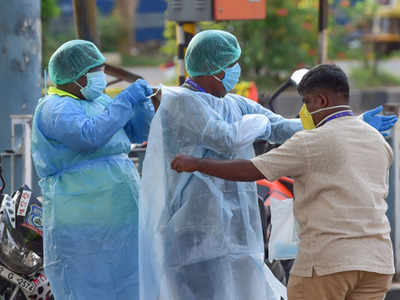When Food Turns Fatal
By: Javid Amin | Srinagar | 11 Aug 2025
The recent Kashmir decomposed meat scandal has shaken the valley to its core, not only exposing glaring loopholes in the food supply chain but also triggering a deep public health alarm. From bustling hotels in Srinagar to small roadside eateries, the possibility that thousands of unsuspecting customers were served rotten, unfit meat has caused outrage, panic, and an urgent call for systemic reform.
Over four tonnes of unsafe meat have been seized and destroyed in recent raids. Two men—Ab Hameed Kuchay and Arif Ahmad Shah—are now at the center of a criminal probe that stretches from the heart of Srinagar to the entry points of Jammu & Kashmir.
Chief Minister Omar Abdullah’s intervention—ordering stringent checks at Lakhanpur and Qazigund, new food testing labs, and a total overhaul of the inspection regime—marks one of the most decisive responses to a food safety crisis in recent memory.
But this scandal is more than a law enforcement story. It’s a public health issue, an economic issue, and a cultural issue rolled into one.
The Rotten Truth – What Authorities Discovered
The Srinagar Police and the Food Safety Department unearthed a disturbing operation:
-
Cold storage units filled with decomposed meat—darkened, foul-smelling, and crawling with bacteria.
-
Over 3,500 kg of unlabelled, spoiled meat destroyed across the valley.
-
Unsafe meat allegedly dumped into open fields and water bodies to evade inspections—potentially contaminating the environment.
-
No hygiene standards, no cold chain maintenance, and no legal labeling.
📌 Key Location: Sunshine Foods at SICOP Zakoora, operated by Ab Hameed Kuchay, allegedly in partnership with Arif Ahmad Shah of Baghat Barzulla.
The Law Responds – FIRs, Seals, and Shutdowns
The case has been registered under:
-
Sections 271, 275, and 61(1) of the Bharatiya Nyaya Sanhita (BNS) – covering offences related to adulteration of food and endangering public health.
-
Food Safety and Standards Act (FSSA) – leading to the sealing of the cold storage facility at Parimpora.
Authorities have stressed that this isn’t merely a business violation—it’s a criminal act with life-threatening consequences.
Public Health at Stake – Why This Scandal is Dangerous
Rotten meat isn’t just unappetizing—it’s deadly.
Health Risks from Decomposed Meat
-
Food poisoning (Salmonella, E. coli, Listeria infections)
-
Severe gastrointestinal distress
-
Sepsis in vulnerable individuals (children, elderly, immunocompromised)
-
Long-term organ damage from bacterial toxins
A single meal containing contaminated meat can cause a chain reaction of illness, affecting not only customers but also their families and communities.
The Chief Minister’s Crackdown – Zero Tolerance
In a rare, swift policy reaction, CM Omar Abdullah has ordered:
-
Border Screening:
-
Check posts at Lakhanpur and Qazigund to inspect every truck carrying mutton, chicken, or fish.
-
Random sampling and on-spot testing.
-
-
Infrastructure Upgrade:
-
Food testing laboratories in every district headquarters.
-
Mobile testing vans for surprise inspections of markets, cold storages, and restaurants.
-
-
Legal Reforms:
-
Mandatory registration of all food distributors, traders, and vendors.
-
Strict licensing framework to prevent fly-by-night operations.
-
-
Criminal Prosecution:
-
Serious violators to face both heavy fines and jail time.
-
📢 CM’s Statement:
“Unscrupulous elements have played with the health and lives of people. This has to stop. There can be no compromise on public health.”
Economic & Cultural Dimensions – Why Fresh Food Matters in Kashmir
The scandal also revives a parallel conversation happening in Kashmir under the banner of the “Only Fresh” movement—a public demand for fresh, locally sourced meat, chicken, and fish instead of mass-processed alternatives.
In Kashmiri culture, food is not just sustenance—it’s an expression of identity. The idea of decomposed or processed meat replacing fresh halal cuts is seen not just as unhealthy but as an insult to tradition.
The “Only Fresh” Vs Processed Food Debate
Here’s a deeper comparison based on both health and economy:
| Aspect | Fresh Meat, Chicken, Fish | Processed Meat |
|---|---|---|
| Nutritional Value | Rich in natural proteins, vitamins, minerals | Often stripped of nutrients; high in preservatives |
| Cultural Value | Supports traditional cooking & local economy | Promotes dependency on industrial supply chains |
| Health Risk | Low if handled hygienically | High due to additives, sodium, nitrates |
| Shelf Life | Shorter; requires cold chain | Longer, but quality is compromised |
What Needs to Change – Policy Recommendations
-
Digitized Tracking: QR-code-based tracking for all meat shipments.
-
Community Watchdogs: Citizen reporting via apps or helplines.
-
Vendor Education: Mandatory training on hygiene and food safety.
-
Stricter Penalties: Repeat offenders should face lifetime trade bans.
A Warning & A Call to Action
This scandal is a turning point. If lessons are learned, it could lead to a stronger, safer food supply chain in Jammu & Kashmir. If ignored, the valley risks more public health crises in the future.
Consumers: Demand transparency. Check labels. Buy from trusted vendors.
Vendors: Keep your operations clean, legal, and ethical.
Authorities: Maintain inspections even when headlines fade.


